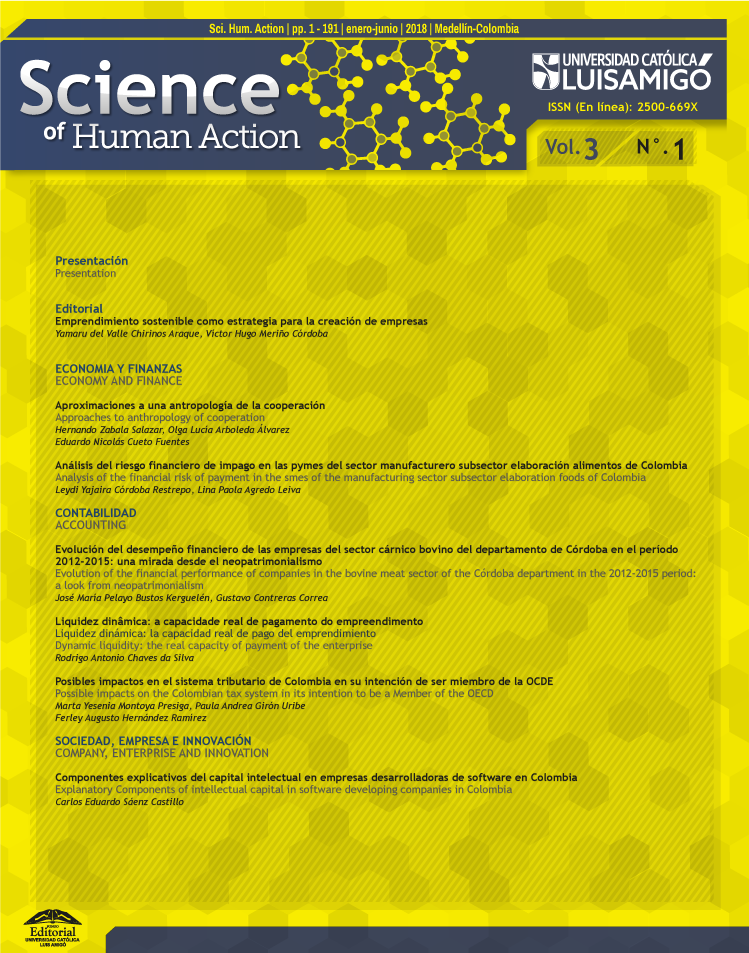Approaches to anthropology of cooperation
DOI:
https://doi.org/10.21501/2500-669X.2710Keywords:
Cooperation, Cooperative culture, Cooperative ethnography, Cooperative educationAbstract
The social practices adhered to the process of formation, organization and development of solidarity economy enterprises, especially cooperatives, have spread throughout the world since the second half of the nineteenth century, making it possible in many places to have developed an economic and social culture determined by the values and guiding principles of this social movement. These practices have been described and analyzed from different social disciplines. However, with a cultural phenomenon occurring in each of these experiences, few studies have used the methods of anthropology to understand the behavior of communities and the individuals involved in these processes, much more when their positive effects on the development of welfare actions and the realization of principles of common good. The authors have found it necessary to delve into the subject of anthropology of cooperation.
Downloads
References
Aguirre-Baztán, A. (1993). Diccionario temático de antropología. Barcelona, España: Boixareu Universitaria.
Escuela de Antropología (1998). La cooperativa y el cooperativismo ante la antropología aplicada. Valdivia, Chile: Universidad Austral de Chile.
De la Vega, G. (1992). Los mejores comentarios reales. Caracas, Venezuela: Biblioteca Ayacucho.
Desroche, H. (1973). Autodesarrollo e intercooperación. En: Farias García, P. et al (1973). Los principios cooperativos y la Europa comunitaria. Zaragoza, España: Escuela de Gerentes Cooperativos.
Desroche, H. (1976). Sociología de la esperanza. Barcelona, España: Herder.
González, Z. F. (2003). Los ritos y rituales en la cultura corporativa de Wal Mart Supercenter. Barcelona, España: Universidad Autónoma de Barcelona.
Harris, M. (2004). Antropología cultural. Madrid, España: Alianza Editorial.
Laidlaw, A. F. (1987). Las cooperativas en el año dos mil. Bogotá, Colombia: CINCOP.
Ramírez, B. (1989). Teoría y doctrina de la cooperación. Bogotá, Colombia: Fondo Nacional Universitario.
Solarte Lindo, F. (1980) El hombre con cola de león. Bogotá: Carlos Valencia Editores.
Zabala, H. (1997). La cooperación en Colombia: Patología de una crisis. Medellín, Colombia: CINCOA.
Downloads
Published
How to Cite
Issue
Section
License
PUBLICATIONS POLICY
• The author must send completed the declaration of transfer of economic rights and declaration of conflicts of interest, which will be provided by the management of the magazine. This document indicates the originality of the article, which is not published in another medium and that is not simultaneously postulated in another journal.
• The author will transfer all rights to the article to the journal Science Of Human Action.
• Once the evaluation of the article has begun, the authors agree not to withdraw it until the end of the process.
• The Science Of Human Action journal will submit the articles received for initial evaluation by the Editorial Committee, in case the Committee finds the material pertinent, it will be evaluated by two anonymous referees who will determine if it is publishable. If one referee approves and the other rejects it, a third party will be appointed.
• The address of Science Of Human Action will answer within a maximum of three (3) days about the receipt of the contribution received from the author.
• Printed items will not be received. All the proponents will have to send their writings through the e-mail of the magazine.
• Partial versions of the text will not be received, that is, those that are not structurally adjusted to the type of article.
• Once the article is sent, it is understood that the author authorizes the publication of these data.
• The reception of articles does not imply an obligation to publish them. The authors are directly responsible for the ideas, judgments and opinions expressed in the articles; in such a way that the content does not compromise the thinking of the Editorial Committee or the Institution.
• Once the article is submitted, it is understood that the author authorizes the publication of the data corresponding to the author's note.
• This is an open access journal that does not charge authors for either the editorial process or the publication. All costs of editorial production are assumed by the Luis Amigó Catholic University.
ETHICS OF PUBLICATION
• The Editorial Committee, by virtue of transparency in the processes, will ensure the academic quality of the journal.
• Causes of rejection are considered: plagiarism, adulteration, invention or falsification of content and author data, which are not original and unpublished.
• In no case, the journal's management will require the author to cite it or publish articles with conflicts of interest.
• If once the article is published: 1) the author discovers substantive errors that threaten the quality or scientificity, may request its removal or correction. 2) If a third party detects the error, it is the obligation of the author to retract immediately and proceed to the public removal or correction.


